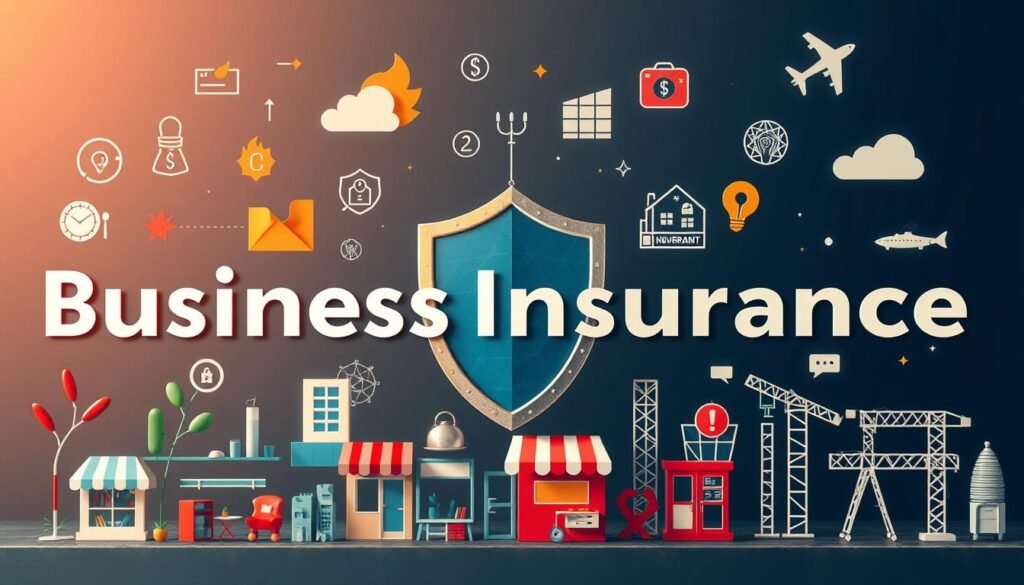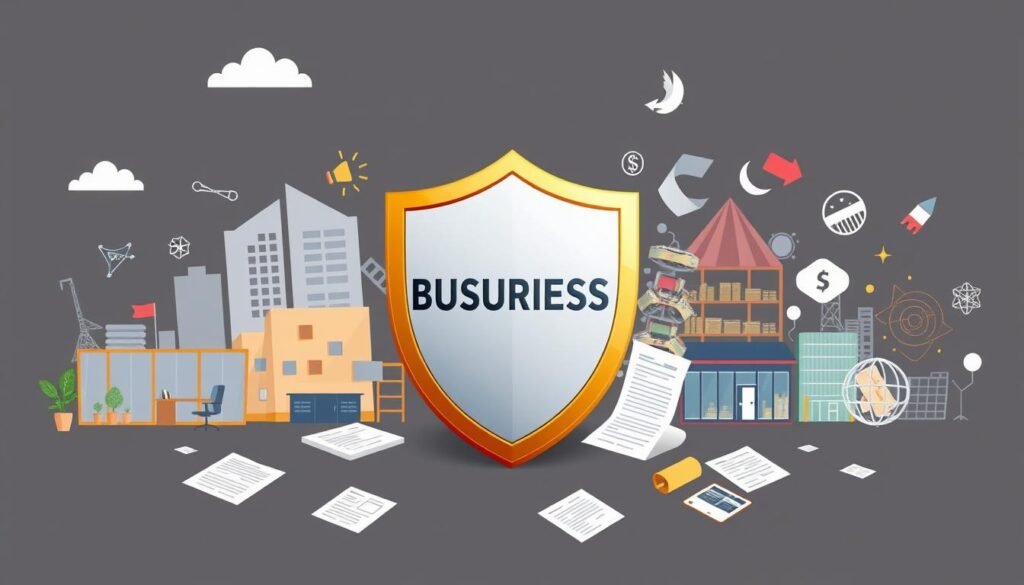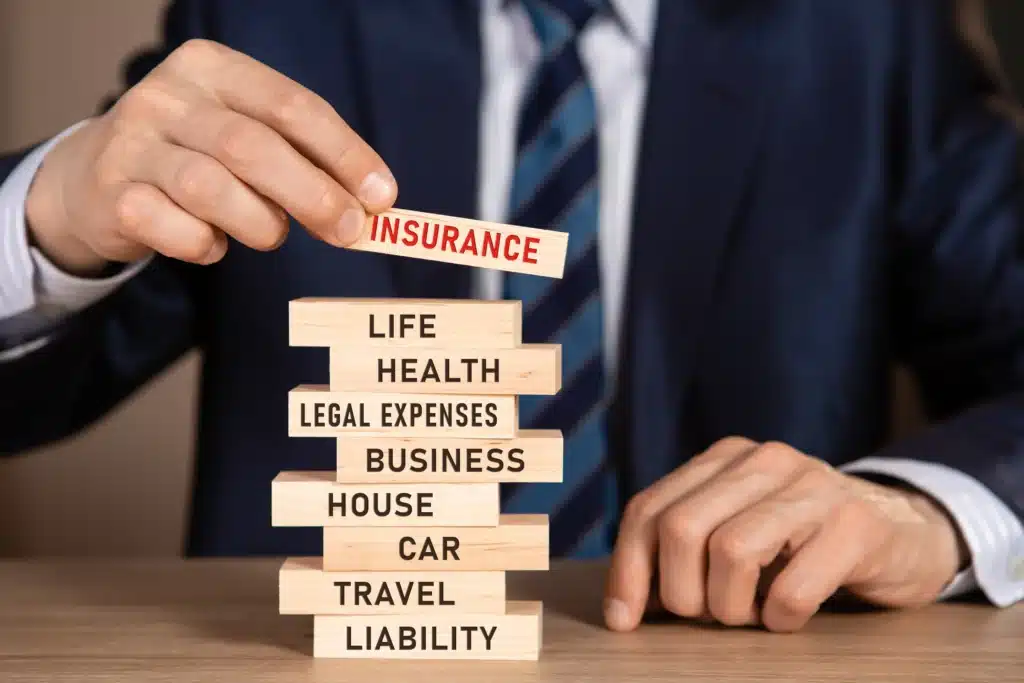Getting the right insurance for your business is key to its success and financial health. There are several important things to think about when choosing insurance. First, it’s vital to know the different business insurance needs policies out there. These can protect against property damage, liability, and even if your business can’t operate.
The size of your business, what you do, where you are, and the risks you face all play a role. For example, if you’re in a high-risk field like construction, you might need more liability coverage. On the other hand, if your business is in a safer field, you might save money by choosing higher deductibles and lower premiums.
It’s also important to keep your insurance up-to-date as your business grows. This means updating your policies when you move, get new equipment, or hire more people. Talking to a trusted insurance broker can help you make smart choices and manage risks well.
Key Takeaways
- Understanding the different types of business insurance policies is crucial for determining the appropriate coverage for your company.
- Factors like business size, industry, location, and potential risks should be considered when selecting insurance plans.
- Maintaining up-to-date and comprehensive business insurance coverage helps protect your company from substantial financial losses.
- Consulting with a professional insurance broker can provide strategic guidance and ensure your business insurance needs are effectively met.
- Regularly reviewing and updating your insurance policies as your business evolves is essential for maintaining appropriate coverage.
Understanding the Different Types of Business Insurance
As a business owner, it’s key to protect your company from risks. Property insurance and liability insurance are two must-haves. They help shield your business from unexpected events and legal claims.
Property Insurance
Property insurance covers losses or damage to physical assets like buildings, equipment, and inventory. It helps you bounce back from disasters, fires, theft, and more. With strong property insurance, you can rest easy knowing your business is safe.
Liability Insurance
Liability insurance protects against claims for bodily injury, property damage, or personal injury. It’s a vital commercial insurance that saves your business from financial ruin. Liability insurance keeps your assets and reputation safe.
Both property insurance and liability insurance are key for most businesses. They guard against common risks and liabilities. A solid business coverage plan is vital for your company’s success and stability.
The Businessowners Policy (BOP) for Small Businesses
Finding the right insurance for small businesses can be tough. But, the Businessowners Policy (BOP) makes it easier. It bundles key coverages into one contract. This includes commercial property insurance, general liability insurance, business income protection, and crime insurance.
A BOP also offers extra coverage options. These include accounts receivable insurance, cyber liability coverage, equipment breakdown protection, personal and advertising injury insurance, rented vehicles liability coverage, and Employment Practices Liability insurance. It’s a great choice for small businesses with fewer than 100 employees and annual sales under $5 million.
Major Coverages in a BOP
A BOP is a convenient and cost-effective way to manage insurance. But, it might not cover all risks. Businesses should check if their specific needs match the BOP’s offerings. Some coverages, like business auto insurance, workers’ compensation, and employee benefits, need separate policies.
| BOP Coverage | Description |
|---|---|
| Property Insurance | Protects against physical damage to a business’s buildings, equipment, and other property. |
| General Liability Insurance | Covers claims of bodily injury, property damage, and personal/advertising injury to third parties. |
| Business Interruption Insurance | Provides financial protection if a covered event forces a business to temporarily suspend operations. |
| Crime Insurance | Protects against financial losses resulting from criminal acts, such as theft or forgery. |
Knowing what a businessowners policy covers helps small business owners choose the right insurance. It ensures their operations are well-protected.
Additional Coverages to Consider

A Businessowners Policy (BOP) is great for many small businesses. But, you might need more coverages based on your business type. Look into Errors and Omissions (E&O) Insurance and Employment Practices Liability Insurance (EPLI).
Errors and Omissions/Professional Liability Insurance
Errors and Omissions (E&O) or Professional Liability Insurance is key for businesses that give advice or services. It protects against claims of financial harm due to mistakes or negligence. Lawyers, accountants, and consultants usually need this additional business insurance.
Employment Practices Liability Insurance
Employment Practices Liability Insurance (EPLI) helps protect employers from lawsuits. It covers claims of discrimination, wrongful termination, and sexual harassment. This professional liability insurance is vital for all businesses, as lawsuits can be very costly.
| Coverage | Key Considerations | Average Cost |
|---|---|---|
| Errors and Omissions (E&O) | Protects against claims of professional negligence, errors, or omissions | $1,000 – $10,000 per year |
| Employment Practices Liability Insurance (EPLI) | Covers claims of discrimination, wrongful termination, sexual harassment, and other employment-related issues | $1,000 – $5,000 per year |
Knowing the risks your business faces is crucial. Getting the right additional business insurance can protect your business and assets. It’s wise to talk to an experienced insurance agent to make sure you have the best professional liability coverage.
Business Insurance Needs

It’s vital to know what business insurance your company needs. You should think about your business’s size, industry, location, and risks. Also, check federal, state, and local laws to meet all commercial insurance requirements, like workers’ compensation and liability coverage.
When looking at small business insurance, focus on these key areas:
- General liability insurance to protect against accidents with customers or clients, like injuries or property damage.
- Property insurance to cover losses from fires, theft, natural disasters, and other dangers to your business assets.
- Workers’ compensation insurance, needed by most states, to cover job-related accidents or illnesses for your employees.
- Commercial auto insurance for company-owned vehicles or those used for business.
- Cyber insurance to protect against data breaches and the costs of notifying customers and offering credit monitoring.
- Professional liability insurance, or errors and omissions (E&O) coverage, to protect against claims of negligence or mistakes in your services.
Consider extra coverage like business interruption insurance, key person insurance, and commercial umbrella policies. This can help protect your business and its finances. By understanding your business insurance needs, you can keep your company safe from many risks.
| Insurance Type | Purpose |
|---|---|
| General Liability | Protects against accidents, injuries, and property damage involving customers or clients |
| Commercial Property | Covers losses to owned or rented business property, such as buildings, inventory, and equipment |
| Workers’ Compensation | Provides coverage for job-related accidents or illnesses for employees |
| Commercial Auto | Covers company-owned vehicles and non-owned vehicles used for business purposes |
| Cyber Insurance | Protects against data breaches and associated costs |
| Professional Liability | Covers claims of negligence or mistakes in professional services |
“Comprehensive business insurance coverage is essential for protecting a company’s assets and operations against a wide range of risks.”
Choosing the Right Limits and Deductibles

When picking business insurance, it’s key to think about the right limits and deductibles. Higher limits mean more commercial insurance coverage, but cost more. Lower deductibles mean less money out of pocket for claims, but cost more overall.
Finding a balance between coverage and cost is vital. Insurance companies give small business owners choices in deductibles. A low deductible means higher premiums, while a high deductible lowers costs.
In general liability and professional liability insurance, there are two coverage limits: per-occurrence and aggregate. The per-occurrence limit is for one incident, and the aggregate is for all claims in a policy period.
Many things affect insurance premiums. These include the type of insurance, coverage amount, policy limits, deductible, and more. Business type, location, revenue, assets, and loss-control programs also play a role. Discounts for profiles or multiple policies can also lower costs.
Getting advice from insurance pros and doing risk assessments is crucial. Regular policy checks and comparing to industry standards help small businesses keep the right business insurance coverage.
Protecting Your Business with the Right Insurance
Keeping your business safe from unexpected events and liabilities is key. Choosing the right insurance is crucial. You need to follow a few steps to make the right choice. These include checking legal needs, understanding risks, figuring out what coverage you need, comparing policies, and picking the best one for your business.
Also Read: What Is Insurance Underwriting And Why Does It Matter?
Steps to Choose Business Insurance
Working with an experienced insurance agent or broker is helpful. They can guide you through the process. Start by learning about different types of business insurance, like general liability, property, and workers’ compensation.
Think about the risks your business faces. Consider your industry, the size of your business, and how many employees you have. After understanding your needs, look at policies from different providers. Make sure the coverage fits your budget and risk level. The right insurance gives you peace of mind, letting you focus on growing your business.
FAQs
Q: What is small business insurance and why do I need it?
A: Small business insurance is a collection of insurance policies designed to protect your business from various risks. Depending on your business needs, it can help cover liabilities, property damage, and income loss, ensuring your business can continue to operate smoothly in the face of unforeseen events.
Q: What type of insurance should I consider for my small business?
A: The type of insurance you need depends on your specific business operations. Common options include general liability insurance, professional liability insurance, commercial property insurance, and business interruption insurance. It’s essential to assess your business risks to determine the right business insurance for you.
Q: How can compensation insurance benefit my business?
A: Compensation insurance, often referred to as workers’ compensation insurance, provides coverage for employees who are injured on the job. It helps cover medical expenses and lost wages, protecting your business from potential lawsuits related to workplace injuries.
Q: What is business interruption insurance, and do I need it?
A: Business interruption insurance is a type of coverage that helps replace lost income if your business is unable to operate due to a covered event, such as a natural disaster. If your business relies heavily on a physical location, this insurance can be crucial to maintain cash flow during disruptions.
Q: Why is professional liability insurance important for my business?
A: Professional liability insurance, also known as errors and omissions insurance, protects your business against claims of negligence or substandard work. This type of insurance is particularly important for service-based businesses, as it can cover legal fees and settlements arising from client disputes.
Q: What is commercial auto insurance, and who needs it?
A: Commercial auto insurance covers vehicles used for business purposes. If you use vehicles for deliveries, transporting clients, or any business-related activity, this insurance is essential to protect your business from liability in case of accidents or damages involving those vehicles.
Q: How does commercial umbrella insurance enhance my existing coverage?
A: Commercial umbrella insurance provides additional liability coverage beyond the limits of your existing insurance policies, such as commercial auto insurance or business liability insurance. It helps protect your business from significant claims and lawsuits that could exceed your primary coverage limits.
Q: What factors influence the insurance cost for my small business?
A: The insurance cost for your small business can be influenced by several factors, including the type of industry you operate in, the size of your business, the specific insurance policies you choose, and your claims history. Assessing your risks accurately can help you obtain the right coverage at a competitive price.
Q: What is cyber liability insurance, and should I consider it?
A: Cyber liability insurance protects your business from financial losses related to data breaches and cyberattacks. If your business handles sensitive customer information, this insurance is increasingly important to mitigate risks associated with data security and privacy breaches.
Q: How can I determine the right business insurance for my specific needs?
A: To determine the right business insurance, evaluate your business operations, potential risks, and legal requirements. Consulting with an insurance professional can help you identify the necessary insurance policies and coverage types to adequately protect your small business.
Source Links
- https://www.business.com/insurance/types/
- https://www.qbe.com/au/news/10-key-considerations-for-your-business
- https://www.thehartford.com/business-insurance/types-of-insurance
- https://www.insurancebusinessmag.com/us/guides/12-types-of-business-insurance-policies-you-should-consider-454902.aspx

